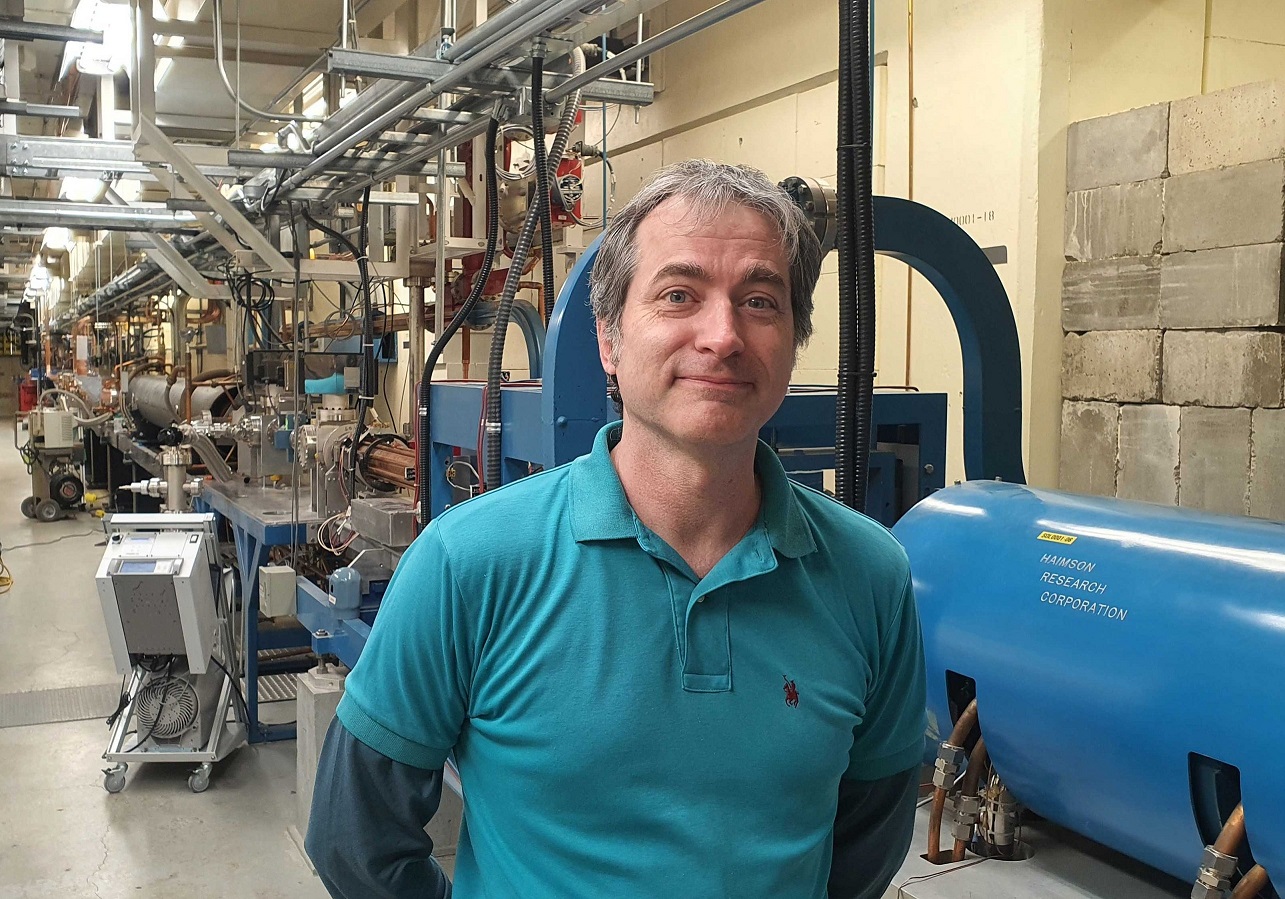
Frédéric Le Pimpec standing in his "lab" at the Canadian Light Source.
Frédéric Le Pimpec
Accelerator Operations and Development Manager
Canadian Light Source Inc.
Learn About My Career
I am responsible for the proper functioning, maintenance and updates of the synchrotron accelerator chain at the Canadian Light Source.
I was born/grew up in: I was born in Aquitaine in South West France, but grew up in and around Paris.
I now live in: I currently live in Saskatoon, Saskatchewan, Canada.
I completed my training/education at: I studied physics at Université Pierre et Marie Curie in Paris (now known as Sorbonne Université). This was followed by a PhD thesis at CERN in Geneva, Switzerland, and a post-doctorate at SLAC near Palo-Alto, California. This post-doctorate is a typical career path for a scientist working in the field of particle accelerators. In short, it's a thesis defended in a laboratory that operates and builds particle accelerators.
My main task is leading a team of 4 groups, made up of 27 people. They all have different skills and expertise. The experience and knowledge I have gained over the years in my various roles now allows me to understand problems. My background also helps me find solutions to these problems. My team and I use the questioning process in our daily activities. This method allows us to find solutions to complex situations without being experts in the fields concerned.
The day unfolds in a relaxed atmosphere. We discuss problems (technical or human), and make decisions on how to proceed. Then I report back to management on problems and solutions identified. To do this, I take part in a lot of one-on-one meetings and communicate with others by email. I also spend my days completing the administrative paperwork including purchase, report validation, and administrative approval of a task).
When I was in school, I did not know anything about working in the world of gas pedals (development and construction). I was much more interested in space and astronomy research. In other words, working in this area was an accident of fate. So, I spent several years developing new gas pedals.
Some time later, I was lucky enough to find a permanent position in the management group for the construction and operation of one of the most powerful gas pedals (microscope). In fact, it was built to extend our knowledge in biology, chemistry and materials science. So, I went from science and research to presenting and representing the European XFEL on the international diplomatic stage. I also contributed to the development of science policy. I did this in my role as a speaker or participant in various European and international organizations such as the OECD (Organization for Economic Cooperation and Development).
My arrival at Canadian Light Source was the result of a desire for change. I also wanted to experience a new side of management. This has allowed me to set the long-term direction for my department. The things my department does is essential to CLS’s competitiveness. Each move to a new environment and abroad developed my ability to adapt. This came about as I experienced different corporate and company cultures. The most difficult part of changing jobs is finding new friends and building a new social life.
My career in science is motivated by the ability to develop new scientific knowledge. I also enjoy sharing this new knowledge through conferences, publications or laboratory activities. Finding and sharing new knowledge has been one of the things that has kept me in this career path. I am also motivated by the people I work with. These people help make my work fulfilling.
However, when boredom sets in or you feel you are no longer making progress, it is time to change your focus - but that is easier said than done. Flexible working hours have always been an important aspect of academic work, because science doesn't necessarily happen between 08:30 a.m. and 5:00 p.m. Advancing research and writing down the results for future generations have been crucial to my interest in staying in this career path.
Today, my greatest interest is to see my department evolve and develop. Knowing that I share responsibility for the success of the department's activities is a very powerful feeling. This contribution can be measured in everyday interactions or in spontaneous appreciation.
Being part of the research or academic world allows me to develop knowledge that can be applied in the future. Discussing with very different and often free-spirited people broadens my horizons. Scientific knowledge is neutral. People and society decide how to use it. What we do, what we discover in our field, can be used in many ways, to make the world a better place. It is possible that what we discover could also be used in other ways.
Over the years, I've been involved in different kinds of activities. What I do is related to my friends from work or outside work. My activities range from sailing to climbing to snowboarding. I enjoy reading fantasy or science fiction novels. I also like watching films of all kinds.
When it comes to a career as a scientist, you need to be aware that it's difficult to get a stable job. This has a direct impact on family life. You need to be aware that there will be very few places available and a lot of work is for a fairly low salary. So talent is one thing, but luck is another.
The alternative to this is in-house research. In fact, if you have an entrepreneurial spirit, don't hesitate to develop your own company. Building your own start-up (like Google, Apple, Hewlet-Packard, Xerox, Genentech) can be a great career path. Above all, don't idolize the idea of the scientist who is free to do his or her own research. Some professors are, but very often they spend more time looking for funding than doing research.
What I do at work
My main task is leading a team of 4 groups, made up of 27 people. They all have different skills and expertise. The experience and knowledge I have gained over the years in my various roles now allows me to understand problems. My background also helps me find solutions to these problems. My team and I use the questioning process in our daily activities. This method allows us to find solutions to complex situations without being experts in the fields concerned.
The day unfolds in a relaxed atmosphere. We discuss problems (technical or human), and make decisions on how to proceed. Then I report back to management on problems and solutions identified. To do this, I take part in a lot of one-on-one meetings and communicate with others by email. I also spend my days completing the administrative paperwork including purchase, report validation, and administrative approval of a task).
My career path is
When I was in school, I did not know anything about working in the world of gas pedals (development and construction). I was much more interested in space and astronomy research. In other words, working in this area was an accident of fate. So, I spent several years developing new gas pedals.
Some time later, I was lucky enough to find a permanent position in the management group for the construction and operation of one of the most powerful gas pedals (microscope). In fact, it was built to extend our knowledge in biology, chemistry and materials science. So, I went from science and research to presenting and representing the European XFEL on the international diplomatic stage. I also contributed to the development of science policy. I did this in my role as a speaker or participant in various European and international organizations such as the OECD (Organization for Economic Cooperation and Development).
My arrival at Canadian Light Source was the result of a desire for change. I also wanted to experience a new side of management. This has allowed me to set the long-term direction for my department. The things my department does is essential to CLS’s competitiveness. Each move to a new environment and abroad developed my ability to adapt. This came about as I experienced different corporate and company cultures. The most difficult part of changing jobs is finding new friends and building a new social life.
I am motivated by
My career in science is motivated by the ability to develop new scientific knowledge. I also enjoy sharing this new knowledge through conferences, publications or laboratory activities. Finding and sharing new knowledge has been one of the things that has kept me in this career path. I am also motivated by the people I work with. These people help make my work fulfilling.
However, when boredom sets in or you feel you are no longer making progress, it is time to change your focus - but that is easier said than done. Flexible working hours have always been an important aspect of academic work, because science doesn't necessarily happen between 08:30 a.m. and 5:00 p.m. Advancing research and writing down the results for future generations have been crucial to my interest in staying in this career path.
Today, my greatest interest is to see my department evolve and develop. Knowing that I share responsibility for the success of the department's activities is a very powerful feeling. This contribution can be measured in everyday interactions or in spontaneous appreciation.
How I affect peoples’ lives
Being part of the research or academic world allows me to develop knowledge that can be applied in the future. Discussing with very different and often free-spirited people broadens my horizons. Scientific knowledge is neutral. People and society decide how to use it. What we do, what we discover in our field, can be used in many ways, to make the world a better place. It is possible that what we discover could also be used in other ways.
Outside of work I
Over the years, I've been involved in different kinds of activities. What I do is related to my friends from work or outside work. My activities range from sailing to climbing to snowboarding. I enjoy reading fantasy or science fiction novels. I also like watching films of all kinds.
My advice to others
When it comes to a career as a scientist, you need to be aware that it's difficult to get a stable job. This has a direct impact on family life. You need to be aware that there will be very few places available and a lot of work is for a fairly low salary. So talent is one thing, but luck is another.
The alternative to this is in-house research. In fact, if you have an entrepreneurial spirit, don't hesitate to develop your own company. Building your own start-up (like Google, Apple, Hewlet-Packard, Xerox, Genentech) can be a great career path. Above all, don't idolize the idea of the scientist who is free to do his or her own research. Some professors are, but very often they spend more time looking for funding than doing research.
When I was a student I enjoyed:
- Computer Science
- History
- Science
- Technology
When I was a student, I would describe myself as someone who:
- Liked reading
- Played video games
- Wasn't sure what I wanted to do
- Never wanted to be in the classroom
Related Topics
Explore More Career Profiles
-
Sarra Filali
Career Profiles
Doctoral Student, Science, Technology and Society
I'm a PhD student, specializing in the relationship between science, technology and society. -
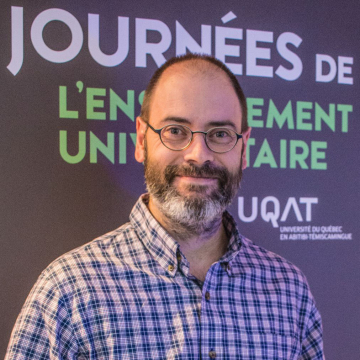
Hugo Asselin (he/him)
Career Profiles
Full Professor
I do research and teach university courses. -
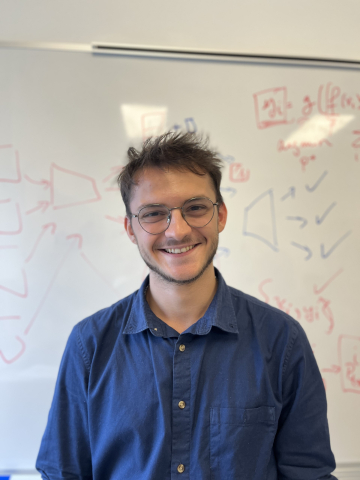
Charles Bricout (he/him)
Career Profiles
Master's Student, Applied Science
I'm a graduate student, and my program includes a major research project supervised by a professor. -
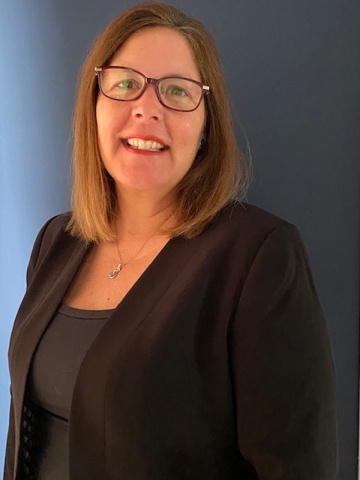
Sonia Francoeur
Career Profiles
Business Manager
I manage sales of laboratory products for part of Quebec and the Ottawa region. -
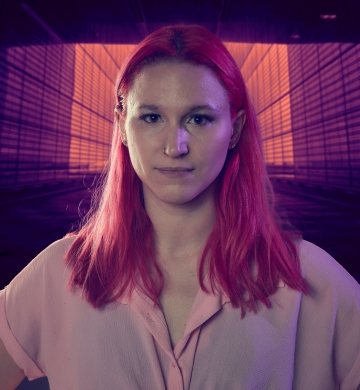
Marion Cossin (she/her)
Career Profiles
Research Engineer
I do research on how acrobats use their equipment and explore the design of new circus equipment and improve the performances. -
Brianna Lummerding
Career Profiles
Agronomic Innovation Manager
I look after all things related to soil management for a group of retailers. -
Li Tan (he/him)
Career Profiles
Molecular Lead
I coordinate the day-to-day operations in the DNA Extraction Lab. -
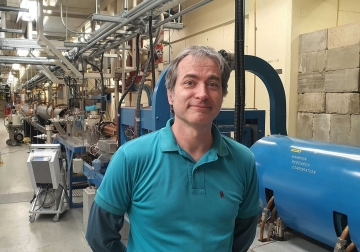
Frédéric Le Pimpec
Career Profiles
Accelerator Operations and Development Manager
I am responsible for the proper functioning, maintenance and updates of the synchrotron accelerator chain at the Canadian Light Source.
-
Tyler Morhart (video)
Career Profiles
Scientist, Beamline Responsible - SyLMAND
I am responsible for the SyLMAND beamline at the Canadian Light Source synchrotron facility. -
Li Tan (Video)
Career Profiles
Molecular Lead
I coordinate the day-to-day operations in the DNA Extraction Lab. -

Rashell Featherstone (she/her)
Career Profiles
Senior Program Associate
I coordinate projects for the development of new products at STEMCELL. -

Kira Hoffman (she/her)
Career Profiles
Postdoctoral Researcher/Fire Ecologist
I am a researcher at both a university and a not-for profit organization where I am gaining experience to become a senior researcher.